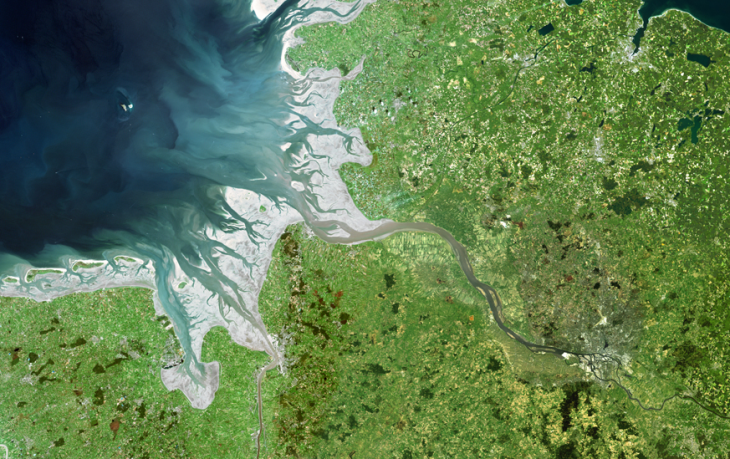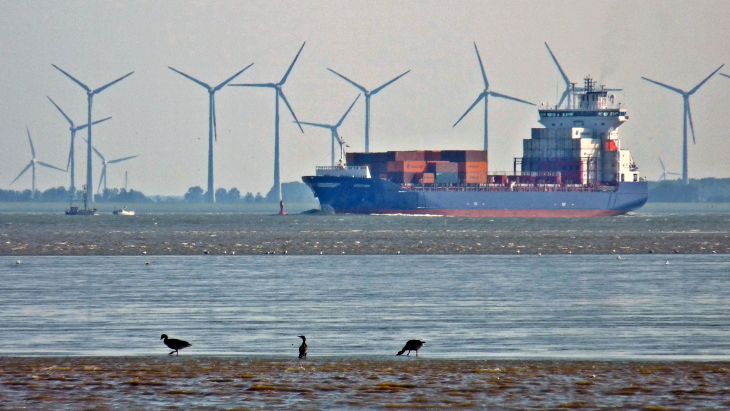New European Research Infrastructure will Bridge the Gap Between Freshwater and Marine Research
The Helmholtz-Zentrum Geesthacht (HZG) and the German Federal Institute of Hydrology (BfG) are German partners in the new European research infrastructure initiative "DANUBIUS – The International Centre for Advanced Studies of River-Delta-Sea Systems.” The HZG will coordinate the “Super Site Elbe”, one of currently eight case studies carried out across Europe.

Satellite image of the Elbe estuary [Photo: NASA Landsat; HZG]
European research on freshwater and marine systems is world-leading but fragmented, largely discipline-specific and often geographically isolated. There is a particular lack of knowledge and research dedicated to the continuum of terrestrial, riverine, estuarine and marine systems, including estuaries, deltas and the interface with groundwater. The increasing demand to harmonize intensive human use and environmental protection necessitates encompassing research on river-sea systems.
DANUBIUS fills this gap and will be implemented as a long-term and large-scale European research infrastructure as was recently decided by the European Strategy Forum on Research Infrastructures (ESFRI) after a one-year evaluation. Since March 2016, DANUBIUS has been included in the ESFRI Roadmap, along with five other new infrastructure projects from various scientific areas.
DANUBIUS is building on existing expertise to facilitate world-leading interdisciplinary research on large river-sea systems. It spans the environmental, social and economic sciences and brings together research on different environmental sectors. It provides access to a range of river-sea systems, facilities and expertise, a “one-stop shop” for knowledge exchange, access to harmonized data and a platform for interdisciplinary research, education and training.

The river Elbe [Photo: HZG]
The Institute of Coastal Research at the HZG will coordinate a supersite “Tidal Elbe River”, one of currently fourteen thematic nodes and supersites in DANUBIUS. Supersites are designated natural sites for observation, research and modelling at locations of great scientific importance across a range of European river-sea systems. Nodes are centres of expertise providing facilities and services, data storage and provision, experimental and in situ measurements facilities and state-of- the-art analytical capabilities.
DANUBIUS will form a “distributed infrastructure”, comprising partners from ten EU countries as well as partners from seventeen other European and non-European countries. DANUBIUS-RI is coordinated by the GeoEcoMar (The National Research and Development Institute for Marine Geology and Geoecology) in Romania. The German partners are the Institute of Coastal Research at the Helmholtz-Zentrum Geesthacht (HZG), the German Federal Institute of Hydrology (BfG, coordinating for Germany) and Terrestrial Environmental Observatories (TERENO).
DANUBIUS’ estimated capital value will be 300 million Euros, consisting of both existing and new research infrastructure. Admission to the ESFRI Roadmap helps in facilitating applications for structural funds to international and national funding bodies . DANUBIUS aims at being operational in ten years’ time.
Contact:
Helmholtz-Zentrum Geesthacht
Centre for Materials and Coastal Research
Max-Planck-Str. 1
21052 Geesthacht
German Federal Institute of Hydrology
Am Mainzer Tor 1
56068 Koblenz
National Research and Development Institute for Marine Geology and Geoecology
Dimitrie Onciul St. 23-25, sector 2
Bukarest (Rumänien)
